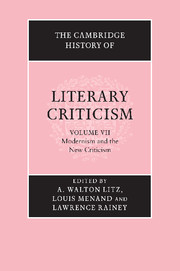Book contents
- Frontmatter
- Introduction
- THE MODERNISTS
- THE NEW CRITICS
- THE CRITIC AND THE INSTITUTIONS OF CULTURE
- 14 Criticism and the academy
- 15 The critic and society, 1900–1950
- 16 The British ‘Man of Letters’ and the rise of the professional
- 17 F. R. Leavis
- 18 Lionel Trilling
- 19 Poet-critics
- 20 Criticism of Fiction
- Bibliography
- Index
- References
20 - Criticism of Fiction
from THE CRITIC AND THE INSTITUTIONS OF CULTURE
Published online by Cambridge University Press: 28 March 2008
- Frontmatter
- Introduction
- THE MODERNISTS
- THE NEW CRITICS
- THE CRITIC AND THE INSTITUTIONS OF CULTURE
- 14 Criticism and the academy
- 15 The critic and society, 1900–1950
- 16 The British ‘Man of Letters’ and the rise of the professional
- 17 F. R. Leavis
- 18 Lionel Trilling
- 19 Poet-critics
- 20 Criticism of Fiction
- Bibliography
- Index
- References
Summary
It would be tempting to cast a chapter on the ‘Criticism of Fiction’ in the form of its own continuous narrative, and as will shortly appear, the history between 1900 and 1960 does have a plausible beginning and a recognisable middle. But it has no coherent end. In the early years of this century serious reflection on the novel was largely the province of novelist-critics who developed a working theory of fiction based on the exigencies of creative activity, and the first phase of the exposition to follow will trace the unsteady development of critical principles as they emerged not only out of literary practice but also out of heated polemical exchange. Indeed a notable feature of the modern consideration of narrative art is that when it passed from the hands of the novelists into the hands of the professors, it continued to bear the imprint of the local controversies that originally set the terms of discussion. The struggle to free a conception of the novel from narrow partisanship makes a large part of the later history of the problem, but instead of providing a denouement for the conceptual drama, it prepares for the radical transformations of the last decades of the century.
The extraordinary range and wearying quantity of criticism of the novel means that several regions of fruitful thought must be neglected or tautly paraphrased. My hope is that a focus on a particular web of figures and concepts will let us see the inner design of the Anglo-American critical bearing during a period when it remained strikingly impervious to outside influences.
- Type
- Chapter
- Information
- The Cambridge History of Literary Criticism , pp. 468 - 498Publisher: Cambridge University PressPrint publication year: 2000



